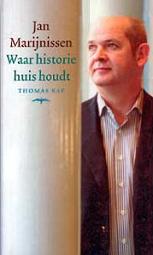
Waar Historie Huis Houdt
Jan Marijnissen
95 pages including index
published in 2005
Jan Marijnissen is the political leader of the Dutch Socialist Party, currently the sole properly socialist party in Dutch parliament, as well as the third biggest party in the country. He has been the driving force behind his party's rise, it owning much of its current succes to the years and decades of hard work Marijnissen and his comrades put into building the party. In recent years this hard work has translated into a certain amount of fame for him as not just a politician but also as what you might call a public intellectual.
It's in this later capacity that Marijnissen has become involved in the great history debate. Amongst historians there has long been concern for the lack of interest the general public shows in their field as well as the ways in which history is taught in schools. Concerns which are perhaps universal. History is after all not a practical, moneymaking subject, so often seen as expendable in school and not directly applicable to real life later on. While interest in history is certainly present in the general public, there has been somewhat of a lack if official attention to it, something that is now slowly changing. Marijnissen has been one of the people who has argued the loudest for more attention to history as an important, central field of education needed to provide us Dutch with a sense of who we are and where we came from. It's this role which led to this book, Waar Historie Huis Houdt, a collection of short essays in which Marijnissen sets ups his personal reasons for finding history important.
He starts first with a short overview of his personal upbringing and how this made him aware of how important history is, as well as how much history is lost by e.g. shortsighted city councils demolishing historical buildings for new developments. In the second chapter Marijnissen examines, through various examples, how important having a sense of history, an understanding of history is. From there he moves on to a general idea of what he means when he's talking about having a sense of history. This finally ends in a plea for a national museum of history for the Netherlands, something that so far has been lacking. And in fact, since publication of this book plans have been made for just such a museum. As a postscript there is a rather cringeworthy letter to Erasmus.
What Marijnissen has to say is all quite thoughful and reasonable, but also somewhat anodyne. Is there anybody who would argue that having a sense of history is not a good thing to have, that it's not a good thing to teach history well and without distortion? Surely not. The hard thing is to determine how history should be taught and what shape this should have. Marijnissen pays some lipservice to the idea that history is not fixed, is as much intepretation of facts as it's facts, but doesn't come to grips with his own view of history.
As I see it, one of the major problems with teaching history in the Netherlands and our sense of history in general is that we tend to avoid the nastier sides of our history, creating a story that talks of our heroic revolt against Spanish Rule, our great and glorious Golden Age, through the heroic resistance against nazi occupation to the present day, but which leaves out the slavery, the more evil aspects of colonalisation or even the simple fact that more people fought for the Germans than against them...
But Marijnissen doesn't realy mention this, which disappointed me. I was hoping to get more of his vision in this book, rather than just a general call to respect history more livened up with personal memories about e.g. the end of Apartheid.
Read more about:
Jan Marijnissen,
Waar Historie Huis Houdt,
history,
book review